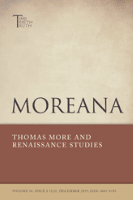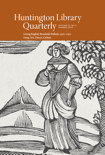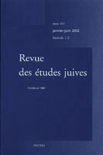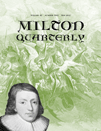
MOREANA
Scope & Guideline
Illuminating the Past, Present, and Future of Legal and Religious Thought
Introduction
Aims and Scopes
- Exploration of Thomas More's Works:
The journal publishes analyses and interpretations of Thomas More's literary and philosophical texts, including his most famous work, 'Utopia', and lesser-known writings, thereby enriching the understanding of his contributions to literature. - Historical Contextualization:
Papers often situate More's works within the historical and political contexts of Tudor England, examining the complexities of his life, his political ideologies, and the socio-political climate of his time. - Interdisciplinary Approaches:
The journal encourages interdisciplinary studies, incorporating perspectives from history, literature, philosophy, and theology to provide a more comprehensive understanding of More's impact. - Comparative Literature:
Scholarly articles frequently draw parallels between More's works and those of other authors, such as Shakespeare and Lucian, highlighting thematic and stylistic connections that enhance literary discourse. - Influence on Modern Thought:
Research published in MOREANA often explores the relevance of More's ideas in contemporary discussions around ethics, governance, and humanism, emphasizing his enduring legacy.
Trending and Emerging
- Comparative Literary Analysis:
There is a growing trend towards comparative studies that connect More's works with those of other authors, particularly Shakespeare and classical figures like Lucian, which enriches the literary context and fosters interdisciplinary dialogue. - Philosophical and Ethical Reflections:
Recent articles increasingly explore the philosophical underpinnings of More's writings, particularly regarding ethics and humanism, reflecting a broader interest in how these themes resonate in today's moral discourse. - Cultural and Historical Impact Studies:
Scholarly attention is shifting towards understanding More's influence on cultural and historical contexts beyond Tudor England, including his impact on modern political thought and literature across different cultures. - Innovative Interpretations of Literary Form:
There is a notable increase in analyses focusing on the literary techniques and forms employed by More, such as epistolary styles and dialogues, indicating a deeper engagement with the nuances of his writing. - Interdisciplinary Connections with Theology:
Emerging themes show a rising interest in the theological dimensions of More's works, particularly how his religious beliefs intersect with his literary and political ideas, revealing a holistic understanding of his contributions.
Declining or Waning
- Traditional Biographical Studies:
There is a noticeable decline in papers that strictly focus on biographical accounts of Thomas More's life, suggesting a transition towards more thematic and analytical explorations of his works rather than historical narratives. - Narrow Historical Analyses:
Research that exclusively addresses narrow historical events from More's life without broader implications or connections to his works is becoming less common, indicating a preference for more integrative studies. - Limited Focus on Early Modern Political Theory:
While political theory remains significant, there seems to be a waning interest in strictly historical political analyses of More's time, with scholars increasingly favoring discussions that link historical political thought to contemporary issues.
Similar Journals

HUNTINGTON LIBRARY QUARTERLY
Challenging Conventions, Inspiring New PerspectivesThe Huntington Library Quarterly, published by University of Pennsylvania Press, is a distinguished academic journal that has been enriching the fields of History, Literature, and Visual Arts since its inception in 1964. With an ISSN of 0018-7895 and E-ISSN 1544-399X, this journal operates from the cultural and scholarly hub of the United States, specifically from Philadelphia, PA. Although unlisted as an Open Access journal, it maintains a robust academic presence with its Q3 ranking in key categories such as History, Literature and Literary Theory, and Visual Arts and Performing Arts for the year 2023. The journal curates a range of scholarly articles that explore the rich interdisciplinary connections among these fields, making it an invaluable resource for researchers, professionals, and students alike who seek to deepen their understanding of cultural and historical contexts. With a strong Scopus ranking, situated within the 52nd to 69th percentiles across its related categories, The Huntington Library Quarterly continuously aims to challenge conventions and inspire innovative discourse in the humanities.

RENAISSANCE AND REFORMATION
Fostering Insights into the Dynamics of Cultural ChangeRENAISSANCE AND REFORMATION is a distinguished academic journal that serves as a vital resource in the fields of history, literature, arts, and philosophy, with a specific focus on the expansive cultural shifts from the Renaissance to the Reformation. Published in Canada, this journal provides scholars, students, and professionals with an avenue to explore the intricate dynamics that shaped early modern thought and practice. While it is not an open access publication, it maintains a commitment to high academic standards, reflected in its diverse range of quartile placements across various categories, including Q3 in Literature and Literary Theory and Q4 in History. The journal is crucial for advancing scholarly discourse on early modern studies and facilitates a deeper understanding of the cultural and intellectual transformations that occurred during this pivotal historical period. RENAISSANCE AND REFORMATION continues to attract contributions from leading researchers and emerging scholars alike, making it an essential read for anyone invested in the complexities of historical thought and artistic expression.

Dirasat Hispanicas-Revista Tunecina de Estudios Hispanicos
Empowering Scholars with Open Access InsightsDirasat Hispanicas-Revista Tunecina de Estudios Hispanicos is a pivotal academic journal published by UNIV TUNIS MANAR, INST SUPERIEUR SCIENCES HUMAINES TUNIS, dedicated to the exploration and analysis of Hispanic studies within the broader context of history, linguistics, and literature. Established in Tunisia, this journal has transitioned to an Open Access model since 2014, promoting the dissemination of knowledge and fostering scholarly exchange among researchers, professionals, and students globally. With its ISSN 2286-5977 and esteemed recognition in various categories, including Q4 in History and Linguistics and Q3 in Literature and Literary Theory, Dirasat Hispanicas strives to bridge gaps in Hispanic scholarship by inviting diverse critical perspectives and innovative research. While its Scopus rankings reflect an evolving presence in the academic landscape, the journal remains committed to enhancing the visibility and impact of Hispanic studies. The journal continues to encourage submissions that contribute to its mission of intellectual advancement, making it an essential resource for those engaged in the rich tapestry of Hispanic cultural and linguistic heritage.

REVUE DES ETUDES JUIVES
Advancing Scholarship in Jewish Studies Since 1967REVUE DES ETUDES JUIVES, published by PEETERS, stands as a vital platform for scholarly discourse in the realms of Cultural Studies, History, Literature and Literary Theory, and Religious Studies. Based in Belgium, this journal, bearing the ISSN 0484-8616 and E-ISSN 1783-175X, has been faithfully chronicling research since its inception, with comprehensive coverage spanning from 1967, 1969, and several periods thereafter until 2023. Although categorized in Q4 quartiles across its fields—showing a diverse yet niche presence—it provides an invaluable space for emerging voices and established scholars to explore Jewish studies in a multidisciplinary context. Despite its compact impact factor and Scopus rankings reflecting its emerging status in the academic community, the journal is committed to fostering dialogue on the cultural and historical aspects of Jewish identity, offering a unique opportunity for researchers, professionals, and students to engage with contemporary and historical issues of Jewish significance. As a non-open access resource, it appeals to those seeking rigorous academic inquiry supported by Peeters' esteemed publishing acumen.

Al-Shajarah
Exploring the Depths of Islamic Thought and CultureAl-Shajarah is an esteemed academic journal that serves as a vital platform for scholarly discourse in the fields of Cultural Studies, History, Philosophy, and Religious Studies. Published by the International Islamic University Malaysia and the International Institute of Islamic Thought and Civilization, the journal reflects a profound commitment to advancing understanding and dialogue surrounding Islamic thought and its place in modern society. With an ISSN of 1394-6870 and an evolving publication history since its convergence in 2011, Al-Shajarah offers valuable insights that cater to a broad array of readers, from seasoned researchers to emerging academics. The journal's rigorous peer-review process and commitment to cultural and religious scholarship are underscored by its categorization in the Q3 and Q4 quartiles in critical academic fields, and its Scopus rankings demonstrate its relevance within the global academic landscape. While open access is not currently available, Al-Shajarah remains a crucial resource for those seeking to enrich their understanding of Islamic civilizations and philosophy, providing access to pioneering research that shapes the conversation within these disciplines.

QUADERNI URBINATI DI CULTURA CLASSICA
Illuminating the Classics through Rigorous AnalysisQUADERNI URBINATI DI CULTURA CLASSICA is a distinguished academic journal dedicated to the interdisciplinary exploration of Classics, Linguistics, and Literary Theory. Published by ACCADEMIA EDITORIALE PISA-ROMA, this journal serves as a vital scholarly platform for researchers and professionals alike, facilitating in-depth discussions and analyses that contribute to these evolving fields. With an ISSN of 0033-4987 and an E-ISSN of 1724-1901, it boasts a robust Scopus ranking, placing it within the second quartile in Classics and the third quartile in related disciplines as of 2023. Although it is not an open-access journal, QUADERNI URBINATI DI CULTURA CLASSICA remains essential for those engaged in the study of language, literature, and classical cultures, encouraging scholarly exchange and innovation from its base in Rome, Italy. Researchers and students will find valuable insights and methodologies within its pages, making it a key resource for fostering academic growth and understanding.

Carte Romanze
Advancing Knowledge in Cultural StudiesCarte Romanze is a prominent academic journal published by Milano University Press, dedicated to the field of literature and cultural studies. With an ISSN of 2282-7447, it offers an invaluable platform for researchers, professionals, and students interested in exploring the rich landscapes of narrative and cultural expression. Since its transition to Open Access in 2013, the journal has championed the dissemination of knowledge, making high-quality research freely available to a global audience. Situated in the historic city of Milan, the journal aims to foster interdisciplinary dialogue and innovation in literary scholarship while maintaining rigorous academic standards. As it continues to contribute to the landscape of contemporary literature studies, Carte Romanze is poised to inspire new scholarly conversations and ideas.

Antichthon
Illuminating the Rich Tapestry of AntiquityAntichthon, published by Cambridge University Press, stands as a vital platform within the field of Classics. Established in 1986, the journal has evolved to encompass scholarly contributions that explore various dimensions of classical studies, including literature, history, and cultural studies. With its rich publication history extending from 2011 to 2023, Antichthon boasts a commendable Q2 ranking in the latest 2023 Category Quartiles for Classics, reflecting its significant impact in the academic community. Although the journal does not offer an Open Access option, it continues to engage researchers and academics with its curated selection of articles, reviews, and critical insights. Located at the Edinburgh Building, Shaftesbury Rd, Cambridge, England, this journal remains an essential resource for both established scholars and students aiming to deepen their understanding of classical antiquity and its enduring relevance.

MILTON QUARTERLY
Charting New Territories in Miltonic StudiesMILTON QUARTERLY, published by Wiley, is a premier academic journal in the field of Literature and Literary Theory. Since its inception in 1967, it has become a leading platform for scholarly discourse, focusing on the works and influence of John Milton and extending to broader themes in literary studies. With an impressive Q1 ranking in its category, the journal is recognized for its high-quality peer-reviewed articles and contribution to advancing literary scholarship. Although it currently does not offer open access options, its impact in the academic community is undeniable, boasting publications that resonate well beyond its pages. The journal is an invaluable resource for researchers, professionals, and students alike, keen on exploring the intersections of literary theory, history, and criticism, making significant contributions to the understanding of literature throughout the centuries.

RINASCIMENTO
Exploring the Depths of Cultural HeritageRINASCIMENTO, an esteemed journal dedicated to the exploration of Cultural Studies, History, and Philosophy, is published by CASA EDITRICE LEO S OLSCHKI in Italy. Since its inception in 1978, this journal has made significant contributions to the scholarly discourse surrounding the rich tapestry of cultural and intellectual heritage. Although it currently holds a Q4 ranking in its respective categories according to the 2023 assessments, its commitment to high-quality research remains steadfast. The journal primarily serves as a platform for emerging ideas and critical analyses, providing scholars and students alike with access to unique perspectives. While it does not offer Open Access options, its relevance to the academic community is underscored by its ongoing dedication to nurturing a rigorous understanding of historical and philosophical contexts. With a focused audience that includes researchers, professionals, and students, RINASCIMENTO continues to be a vital resource for those looking to delve into the complexities of cultural history and philosophy.